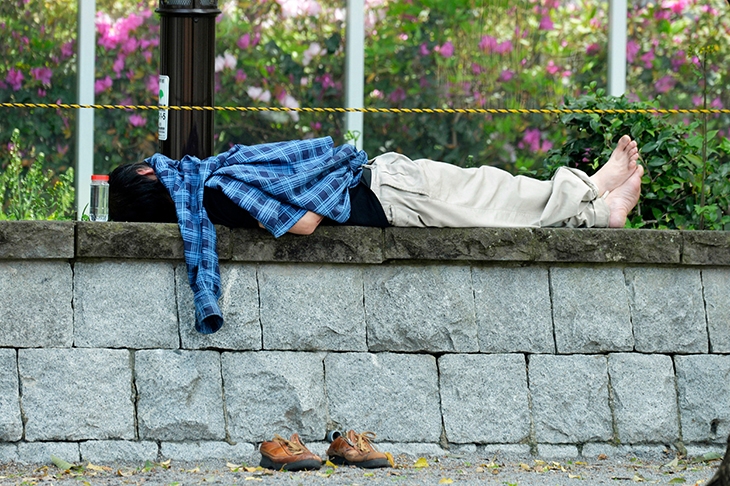In 1923, an earthquake with a magnitude of 9 struck Tokyo and Yokohama. A huge area of Tokyo burned. But, Ueno Park, protected by the water of Shinobazu pond, survived unscathed, as did many of the people from around Tokyo who sought refuge there. Emperor Hirohito visited the park and its new homeless residents soon after, and presented it as a gift to the people of the city, renaming it UenoImperial Gift Park.
Ueno Park is central to this novel by Yu Miri, whose Family Cinema won the prestigious Akutagawa Prize in 1997. Almost a century on from the Great Kanto Earthquake, the homeless victims of a different type of disaster — the 1990 economic crash — have set up huts and tents there. Unlike the victims of the earthquake, however, they are not welcome; when the imperial family visit the galleries in the park, the 500 huts that make up the homeless ‘village’ are ‘cleaned up’ and the occupants instructed to leave. The spirit of Kazu — a man born in the same year as the current emperor — which lingers in the park, eavesdropping on conversations and reminiscing about life as one of the park’s homeless residents, narrates.
In life, Kazu is impoverished; he starts working at the age of 12, farming rice, wakame and clams; as an adult, he leaves his parents, wife and two young children to work in Tokyo, building stadiums for the 1963 Olympics. While his work takes him close to key aspects of Japanese society — the Olympics and farming traditional Japanese ingredients — he is forever denied a place in it, and ends up marooned, lost and barely considered a person in Ueno Park. (Schoolboys, nicknamed ‘homeless hunters’, attack homeless men, often not realising that they are doing anything wrong or that their victims count as people.) His outsider status follows him everywhere. During hydrangea-viewing season, he sees in the shape of a flower’s petals the face of a type of demon that often guards temples to ward off strangers and evil spirits.
Miri, a Zainichi-Korean (born in Japan, of Korean descent and with South Korean nationality) is an outsider herself in Japan’s largely homogenous society where racism against ethnic minorities prevails unchecked. Because of this, perhaps, she writes about marginal people with deep understanding and sensitivity, using the location of Ueno Park to challenge the hypocrisies of a society that purports to cherish hospitality, kindness and cooperation. The emperor’s ‘gift’, she demonstrates, extends only so far. Her writing — laconic, strange, haunting and beautifully preserved in this translation by Morgan Giles — is exceptional. To read this novel is to feel possessed by Kazu’s spirit, to feel the effects of injustice, his pain and his grief deeply, and to wish better for those like him.






Comments